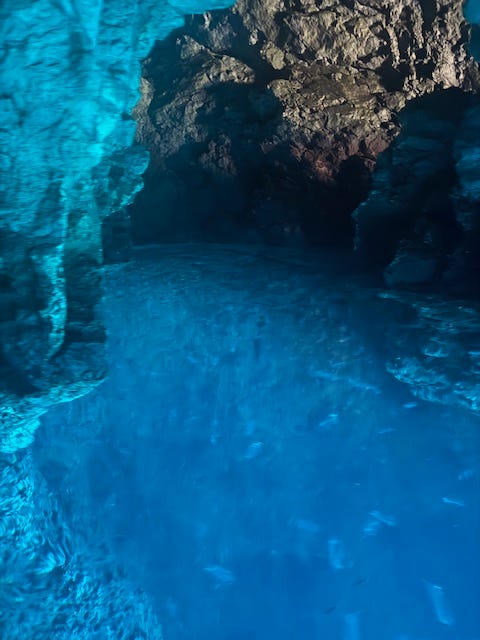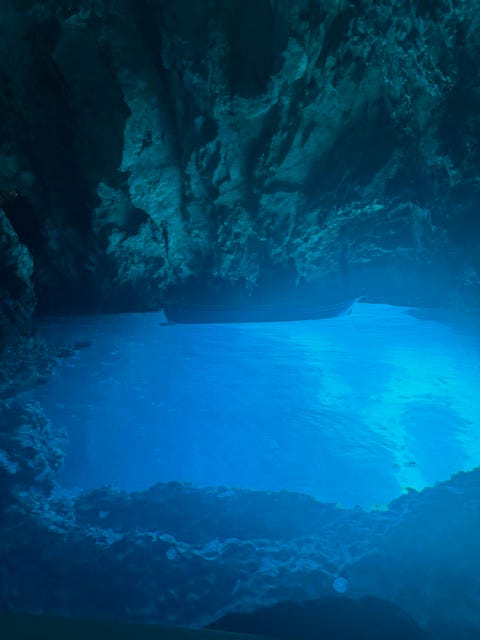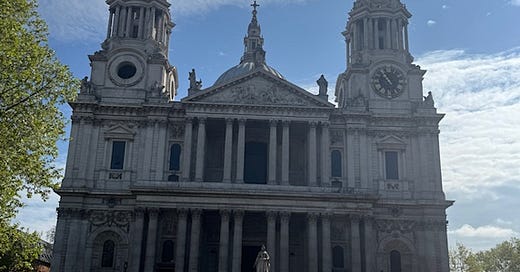In the run up to Easter, I found myself clinging on to a cathedral.
“OMG. They’re all mini mes,” said the man who had brought our starters in a restaurant in the middle of Brighton. He was studying the faces of the four daughters we had successfully brought back from Croatia. “We’re never doing it again,” said my husband, “this is our last family holiday EVER”. But then he’d said that in Prague last year and in Berlin, the year before that. With support from Google, SevenRooms and Tripadvisor, I had booked a place called The Coal Shed as soon as I sat down on the Gatwick Express. I needed somewhere that could accommodate six people at what could no longer be considered lunchtime, somewhere with a rating of at least 4.5. I told the man we were casualties of an easyJet scheduling change with a six-hour layover to fill. We had put our largest suitcases into left luggage and hopped on a train.
He told me he was a former British Airways steward. “I have five sisters,” he said. “Are you the only boy?” I asked. “No,” he said. “I’ve got nine brothers and we’re not even Catholics”. There was a wedding party assembling to our right. The bride was in pink, her baby due any day. Two pensioners were sitting opposite us, side by side, so they didn’t miss anything. It was the Thursday of Easter Week, and I had ordered a large glass of rioja because I was on my way home. I’d had my escape. Reality beckoned. “Do you all get together?” I asked. “No,” he said. “I can’t stand the eldest. She tried to turn everyone against me”. I looked into his face. There was sorrow buried in there. “Oh,” I said. “It must be hard to like fourteen siblings”. “It must be hard to like fourteen people,” said the waitress. We were strangers, our lives thrown together by chance. Our encounter had depended on a random set of circumstances and enough decent Tripadvisor reviews. I was reminded of what Pope Francis had said in his final homily1.
“We must look for him in the faces of our brothers and sisters, look for him in everyday business, in the most ordinary and unpredictable situations of our lives, look for him everywhere except in the tomb”.
I wasn’t sure what I was expecting from the cathedral. It had kind of fallen into place. We were staying a Saturday night in London before heading on to Split. St Paul’s was on our hotel doorstep. And when I’d looked it up, there was a special Easter Sunday Mattins service led by the choir. There would be canticles and psalms and readings and prayers. “There’s no sermon,” I told the teenagers, including the atheist. And with this, I sold it to them. And as the bells called the six of us up Ludgate Hill, I still wasn’t sure what I was expecting to find in this cathedral. I only hoped I’d find something. “I’m not feeling holy,” I’d said to my husband as Palm Sunday drew to a close. I’d been reminded that Hosanna meant “save us”. I’d been reminded about the significance of a donkey. But I couldn’t muster up any enthusiasm for Holy Monday or Holy Tuesday or Holy Wednesday or Holy Thursday. I couldn’t bear to attend services which felt dutiful, formulaic, restrictive, which lacked honest conversation, and the consolation of shared experience, where everyone faced forward, where I knew I’d struggle to get anything from a one-way listening exercise, from hearing more theory about how I should be living, when the practice of how I was living could only be described as a low-level humming anxiety.
“What’s your dad’s medication for again?” my mother had texted as I considered my Adriatic wardrobe. “It’s making him miserable”. I was carrying the weight of anticipatory grief, seeing my elderly parents juggle multiple health conditions, watching them decline towards an inevitable outcome. “If you’re away, we’ll not go out,” they’d said. I wanted to see more of the world. This was at risk as their world became smaller. Someone had to be close by in case of emergency. I’d received calls for help in the cinema, after stepping off flights, when one glass of champagne down on New Year’s Eve. The hospital appointments were at 9am, at 11.41, at 3 o’clock in the afternoon. It was hard to plan anything, to believe it would happen. I could feel my longed-for freedom slipping away. And I was crushed by it. I’d gone straight from childcare into eldercare with very little respite. “Holy Week is the handful of days the church must sit with its grief,” said Mike Glenn2. We weren’t to rush through it, its darkness, its hopelessness, its despair. “It’s Friday but Sunday is coming” we were constantly being told. We’d get there, to the Hallelujah. But I was living in an endless Friday. I could be here for a while. I didn’t know when Sunday would arrive. “Easter is about Jesus, but Easter is also about us,” said Diana Butler Bass3. I’d heard the Easter story many times before. It was a totally different thing to realise I was living it.
“When we say hallelujah on this Easter morning, we’re also saying hallelujah to our own lives, to where they’re going, to what we believe in, and hope for. Reality rolls through cycles of death and resurrection, death and resurrection, death and resurrection,” said Richard Rohr4.
In St Paul’s Cathedral, there were altar boys and altar girls. The service was led primarily by women. “Wherever you come from, you are welcome here,” one of them said. Eight words. This was a sermon. I looked up at the dome. I looked towards the Quire. I looked round the nave. I looked at the people. I was surrounded by all of humanity, young, old, rich, poor, male, female, the hopeful, the hopeless, the certain, the uncertain. There were people dressed in their finery. There were people dressed in their running gear. They were carrying handbags, rucksacks, coffees. They came empty-handed. They were from all backgrounds, all nationalities, all histories, all futures. They were citizens, refugees, tourists, visitors. They were here intentionally. They’d walked in accidently. Regardless of where they came from, no matter how late they were arriving, there were ushers continually beckoning them in, guiding them up the aisles, inviting them to stay. They were loving them with their hands, with their smiles, with their eyes, with their open faces. This was what I was supposed to find here, in this cathedral.
I remembered a podcast5 I had listened to over and over again on Good Friday. I had checked the transcript. Love was mentioned 79 times.
“The foundation of all law, the purpose of existence, the point of Easter and the balm that will heal us is to love and be loved”.
“What is asked of us is both so enormous that it can cast stars into space and so tiny that it affects even how you’re sitting in relation to the person next to you, wherever you might be right now”.
“The unifying characteristic that leads us to care is the humanness of the other person, not their politics, gender, race, sexual orientation, bodily condition, age or socioeconomic resource”.
Vulnerable human to human connection, Gareth Higgins said, mattered. It transcended our differences. It would probably save us in the end. “We belong to each other nested between the common and the cosmic good”.
“Did you know we are carents?” my sister messaged as she sat in a surgery waiting room and studied a poster on the wall. There had been an incident while I was enjoying my ‘Blue Cave, Mamma Mia and Hvar, Five Islands Speedboat Tour’ and she was picking up the pieces. Caring for elderly parents. There was a name for us. Carents. It could be overwhelming, the website6 said, but you didn’t have to do it alone.
On the Sunday after Easter Sunday, I listened to a sermon. The church had moved into the period it called ‘Ordinary Time’, the period that wasn’t Advent or Lent or Christmas or Easter. “We are building a cathedral with our lives,” said the minister. What we did mattered, it seemed, the small, the big, the difficult, the seemingly ordinary, the seemingly impossible acts of love. It all added up.
“It’s not a victory march,” said Jeff Buckley about love. “It's a cold and it's a broken hallelujah”
But it was still a Hallelujah.
P.S. The Blue Cave is stunning. Here’s a couple of photos:


P.P.S. I promise to tell you a funny story next week.
P.P.P.S. If you’re a carent, get in touch. Because we can’t do this alone.







And, throw into the mix that you are modelling the 'caring for elderly parents' bit for your daughters when their times to care for you; set the bar good and high
This was fabulous Deborah. Reminded me a bit Of Barbara Brown Taylor and thats a pretty big compliment in my world. Finished your tremendous collection of essays a couple of weeks ago.
They were terrific. You put so much research into each one and made lots of very helpful stuff accessible and available to us as we read them so thankyou!